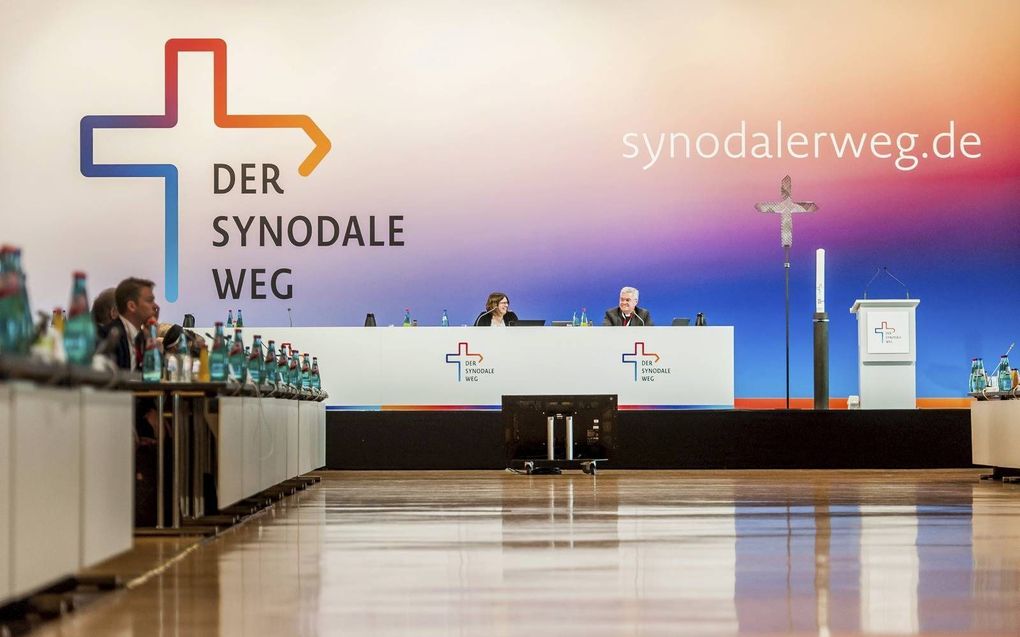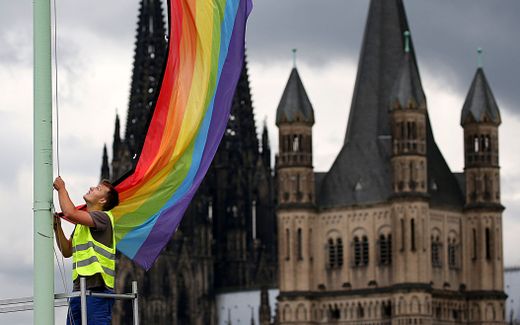German Catholic Church divided over sexuality and of women
31-01-2022
Central Europe
Klaas van der Zwaag, RD

Meeting of The Synodal Way, the notorious participation platform in the German RKK. Photo The Synodal Way, Maximilian von Lachner
Central Europe
This week, the notorious Synodal Way consultation platform in the German Roman Catholic Church will discuss homosexuality and celibacy. "The church is protestantising by relativising the offices," criticises Roman Catholic priest Guido Rodheudt.
Last week, in a TV documentary, 125 workers within the Roman Catholic Church (RCC) in Germany openly declared themselves to be homosexual. They demanded, among other things, changes to church labour law. The "discrimination" against homosexuals, they said, is a "betrayal of the Gospel" and forces people into a "system of silence, double standards and insincerity." The signatories call for the revision of "defamatory and outdated statements of the Church's teaching on sexuality" based on theological and new scientific insights.
The German Bishops' Conference expressed its support for this. Bishop Helmut Dieser of Aachen, chairman of the sexuality and relationships section of the Synodal Way, characterised the initiative as promoting a "climate of freedom from fear in the Church."
The action followed an article by the Congregation for the Doctrine of the Faith in Rome, which reaffirmed that the RCC is not competent to bless same-sex relationships. The same applies to the ordination of female priests. This position was also reaffirmed last week by the Eastern Orthodox Churches, with whom Rome is in line in terms of ministerial vision. At the third meeting of the Synod, which will take place from 3 to 5 February, draft texts will be on the table that argue for a liturgy for the blessing of same-sex relationships.
Notorious
On Monday, two notorious books will be published at Herder Publishing Company that promote the rights of homosexuals and female ministers and priests, namely "Gewollt. Geliebt. Gesegnet. Queer-Sein in der katholischen Kirche" (Wanted. Loved. Blessed. Being Queer in the Catholic Church) and "Frauen ins Amt! Männer der Kirche solidarisieren sich" (Women into office! Men of the Church stand in solidarity). In the second publication, one hundred men –priests, laypeople and bishops– show their solidarity with women's wishes to become active in the Church. One editor, Philippa Rath, is a member of the Central Committee of German Catholics, a delegate to the Synodal Way and a member of the Synodal Forum "Women in the Services and Offices of the Church". The second editor, Burkhard Hose, is a university pastor in Würzburg and co-initiator of a signature campaign against the Vatican's ban on the blessing of homosexual partnerships.
The book "Gewollt" is edited by the Roman Catholic priest Wolfgang F. Rothe, known for his defence of the rights of women and homosexuals in the RCC. To top it all off, on Monday, Cardinal Jean Claude Hollerich will publish "Was auf dem Spiel steht" (What is at stake), his first statement on the abuse crisis and possible reforms. He advocates married priests and "a change of perspective in sexual morality." Hollerich will receive the Abraham Geiger Prize 2022 on Monday, awarded to people who work for "pluralism" and "openness, courage, tolerance and freedom of thought."
However, in response to all these developments, a powerful orthodox countermovement has emerged within the RCC. The conservative Cardinal Gerhard Müller, former Prefect of the Congregation for the Doctrine of the Faith, published at Friedrich Pustet Publishing House "Wahrheit. Die DNA der Kirche" (Truth. The DNA of the Church), in which he blamed the "protestants" for seeing the ministry only as a religious function in the Christian Congregation and thus depriving it of its sacramental character.
Longstocking
In a book, the Roman Catholic journalist Dorothea Schmidt describes today's RCC in Germany as a "Pippi Langstrumpf Kirche" (Pippi Longstocking Church; Fe Media Publishing), named after the free-spirited girl Pippi Longstocking by the Swedish writer Astrid Lindgren. According to her, German Catholics should realise that they represent only 1.2 per cent of the Roman Catholic world church.
The conservative bishop Rudolf Voderholzer, a member of the Synodal Way and a member of the Women, Ministry and Worship Section, refers in a recent publication, "Zur Erneuerung der Kirche" (On the renewal of the Church; Pustet Publishing House), to Pope Benedict XVI's answer to the crisis of the Church today. It does not lie in adapting to the spirit of the times but in conversion, sanctification and deepening of personal faith. Last September, Voderholzer opened a new website on which he and a group of other members of the Synodal Way published alternative texts on sensitive topics. He calls for a halt to the "democratisation of the Church". However, Pope Francis, listening and understanding to the voice of the times, has already made it clear that a synod is not a democratic parliament.
Roman Catholics increasingly accuse the German RCC of having "Pprotestant" traits, i.e., believers interpret Scripture autonomously and do not allow themselves to be guided by the Church as guardian of doctrine. The priest Guido Rodheudt in the diocese of Aachen warned this week in the German newspaper "Die Tagespost" that the Synodal Way is becoming a kind of "Reformation 2.0". He sees the position of priests being jeopardised by the advocated abolition of compulsory celibacy. "The Synodal Way aims at emancipation of the flock from the shepherds. Unlike the rest of the Catholic Church, the action proposals are aimed at a protestant levelling of the thinking between God and the world."
This article was published previously in the Dutch Reformatorisch Dagblad on 29 January 2022



